Pema Tshewang* and Cheten Gyeltshen
Ministry of Education and Skill Development, Royal Government of Bhutan, Bhutan
*Corresponding Author: Pema Tshewang, Ministry of Education and Skill Development, Royal Government of Bhutan, Bhutan.
Received: March 14, 2023; Published: March 23, 2023
Citation: Pema Tshewang and Cheten Gyeltshen. “Assessment of Teachers’ Attitude in Teaching the Mixed Ethnic Students of Yoeseltse MSS and Peljorling HSS”. Acta Scientific Paediatrics 6.4 (2023): 16-28.
Teachers are regarded as the basic tools in education and curriculum implementations, (Folashade, 2009) [8]. The quality of any nation’s education is determined by the qualities of the teachers and their attitude towards the profession and their learners. This paper intends to examine teachers’ attitude measured by 15 questionnaires on a point-point scale (as shown in appendix 1). Further, the responses are sub-categorized to examine attitude of both male and female teachers and has analyzed attitude variations between young and old teachers based on their teaching experiences. The result indicated that there exists a significant positive attitude of teachers in teaching mixed ethnics students. The result also indicated that there exists no significant relationship between male and female teachers, however in some indicators, female teachers are found to be more positive compared to male teachers. Teachers above 10 years in teaching service displayed more positive attitude than teachers less than 10 years of teaching experience. There is no significant relationship between teachers’ attitude and their qualification. In general, the study revealed there is positive attitude in teaching mixed ethnic students with 37 percent male and 34 percent female teachers chose ‘Agree’ in the Likert scale. Subsequently, the study revealed that male teachers are more comfortable to teach mixed ethnic students than female teachers.Besides, teachers with more experiences showed slightly greater positive attitude compared to less experienced teachers.
Keywords: Attitude; Gender; Mixed Ethnic Students; Teachers
Broadly, the meaning of mixed ethnic communities can be interpreted in various ways depending on the lifestyle of people, the way their government functions and the policies in practice. However, according to the author of this paper, it refers to groups of people of the same origin (race), practice common religion, share common culture and traditions, speak the same language.
Bhutan’s population consists of mixed ethnic people who speak different languages, practice different cultures and traditions. They are classified as Ngalop, who speak the Dzongkha language, the Sharchop of eastern Bhutan who speak Tsangla. The Lhotshampa are Southern Bhutanese who speak Nepali language and generally practices Hindu religion. There are other minor indigenous ethnic groups such as Layap, Lhop, Monpa, Khengpa, Brokpa, Kurtoep and several minorities living in villages scattered throughout Bhutan. Generally, according to the official census conducted in 2002, Bhutan is classified into four major ethnic groups: Ngalong, Sarchop, Kheng and Lhotsampa that make up 98 percent of the population.
School is one of the institutions where students from all walks of life come to receive formal education. Education is a human right for every child of different ethnicity. Schools across the country should accommodate all children, regardless of their physical, intellectual, social, emotional, linguistic or other conditions. According to Annual Education Report 2022, there are 1,68,324 students against 9902 teachers, (MoE, Bhutan) [17]. The statistical figure in ethnic-wise enrolment is documented in numerous publications made by the ministry. Teaching mixed-ethnic students who come from various language background, social, cultural, emotional background, there is a significant gap presented in learning proficiency, both weakness and strength and approaches of learning are noticeable. Some of the researches state that racial distinctions are among the most difficult to deal with and to overcome because they are more easily seen. And racial differences in America are associated with difference in status and in access to many opportunities (Hearn, 1968) [10].
This paper examines what are some of the problems and challenges that Bhutanese teachers face while teaching mixed ethnic students because ethnics distinctions are among the most difficult to deal with and to overcome because they are more easily seen and experienced by teachers, (Hearn, 1968) [10]. One of these is discipline, that ties closely with classroom management. This challenge usually occurs when the students in the class feel frustrated; the brighter (or advanced students) may feel that they are not being challenged enough and are not learning as much as they can, while the weaker students feel that the tasks and learning materials are too difficult or the teacher does not assist them enough. Studies in the field of multicultural education show that effective teaching of multicultural classes is unquestionably one of the biggest challenges that teachers face today.
Secondly, student participation is another worry with many educationists. In a mixed-ability class, the teacher will find that the stronger students generally participate more than the less advanced students. This may be due to the introvert nature of the less advanced students or because they are aware that they are not the top students in the class and are scared of getting the answer wrong. Lack of participation can also lead to the less advanced students performing even less (or worse) in classroom. Ideally, a teacher wants all students to participate equally in class; however, this is almost never the case (McAllister and Irvine, 2002) [16]. For example, teachers in multicultural classrooms face increasing challenges in providing an appropriate classroom environment and high standards of instruction that foster the academic achievement of all students, particularly students of color from low socioeconomic backgrounds.
The third challenge is lack of individual awareness, that the teacher may not be able to follow and track the progress of all the students as closely. As a result, the teacher might not be able to devote adequate time and attention to less advanced students. In a mixed ethnic class, the teachers might find that they spend too much time on particular group of students. Other researchers uphold that teaching multicultural classes today requires teachers with extra competencies and skills at the level of interaction, classroom management, and assessment. Similarly, many sociologists feel that the class with mixed ethnics is vague and misleading, and have chosen to employ such terms as ‘minorities’, ‘nationalities’ and ‘ethnic groups’ (Hearn, 1968) [10]. In fact, all teachers across Bhutan does not face similar challenges, it depends on the type of school settings and ethnic surrounding. This paper is a quantitative research of two schools in Samtse Dzongkhag, in which the students come from different ethnic backgrounds.
Inclusive education is based on the principle that all people are equal and should be respected and valued, as an issue of basic human rights, involving and supporting all people to participate in the cultures, curricula and communities in different educational setting. Hurdles to learning and participation for everyone, irrespective of their ethnicity, culture, disability or any other factor, are actively reduced so that students can feel a sense of belongingness in the learning community in the educational context. Inclusive education involves placing all children and young people into the same mainstream schools and classrooms as normal setting. It is also the current system of special education (Davis, 2009) [5].
To achieve inclusive education, there should be change in thoughts unlike in the past so that people understand values and accept to teach all children in non-discriminatory settings (Margolis, 2002) [15]. Inclusive education presents dual system on education. The needs of all children will be met in inclusive environments and it produces students who are better educated and better able to participate and contribute as members of their communities and society and nation as a whole. Inclusive education helps build inclusive communities where each member is supported to contribute, and where the human values are created and as a result it supports societies to achieve their most important goals. All children and young people have the right to learn together, so that they can develop relationships, skills and knowledge for everyday life.
No children should be denied the right to participate fully in education alongside others of their age. The role of education is to support people to be and become participating citizens in a democratic society. To achieve inclusive education, the resources, understandings, values and commitment to teach all children equally well in non-discriminatory settings should be given priority. Inclusive education as it is used here refers to particular ways of thinking about all groups of students and to educational structures that separate and differentiate them from their peer group (Sharma, 2018) [22].
There are many children deprived of education. Children have ambitions and dreams for their future. They need quality education to develop their skills and realize their full potential. Children from all ethnicity should be taken into consideration while policymaking, providing access to education and in developing their ability to participate in social, economic and political avenues. Worldwide, many children are most likely to be out of school. They face persistent barriers to education stemming from discrimination, stigma and the routine failure of decision makers to incorporate different cultural groups in school services. Inclusive education is the most effective way to give all children a fair chance to go to school, learn and develop the skills they need to excel at.
According to Kelly (2004) [12], inclusive education means all children are the same in different school and classroom settings. It means real learning opportunities for groups who have traditionally been excluded because of different beliefs. Inclusive systems require changes at all levels of society. At the school level, teachers must be trained, buildings must be refurbished and students must receive accessible learning materials. At the community level, stigma and discrimination must be tackled and individuals need to be educated on the benefit of inclusive education. At the national level, governments must align laws and policies and regularly collect and analyze data to ensure that children receive effective services. For students and teachers, classrooms and communities are important factors in inclusive education. Small changes can lead to larger transformations, and these can ripple across the classroom and school system.
Bhutan in practice of inclusive education, many schools in Bhutan lack most of the essential needs such as trained teachers. Therefore, the whole idea of inclusive education is defeated when teacher lacks competencies and proper attitude towards teaching mixed ethnic groups of students.
Every student is unique and every group of students is different. Diversity in schools should be given as learners have different experiences, cultures, beliefs and values. This diversity is something all teachers come across. It can present challenges for teachers, students and their parents. It also creates opportunities for growth and better connection in personal, social and academic achievement (Norwich, 2002) [19]. Moreover, it is a strengthbased and personalized curriculum, they recognize each student has inherent strengths and talents. These strengths, as well as a student’s specific needs, should be placed at the center of curriculum planning and implementation. This optimizes opportunities for both teachers’ and students’ learning (Norwich, 2002) [19]. It helps students’ engagement, agency and voice out for a meaningful contribution to their schooling and educational experience (Norwich, 2002) [19]. Student roles are often consultative, rather than active, even when matters directly affect them. The key to listening well is to have a belief in students’ capabilities, and to develop relationships of trust and respect. It’s not one-sided: students need to trust their teacher too. When students are given a platform to share their voice, schools gain insider knowledge and better understand the student-experiences. It sends a clear message that student engagement is important.
The effective attitudes and actions employed by teachers ultimately can make a positive difference on the lives of their students (Gourneau, 2005) [9]. On other hand, there are other negative attitudes that can be considered barriers to learners.
The positive attitudes include, a genuine caring and kindness of the teacher, willingness to share the responsibility involved in a classroom, sincere sensitivity to the students’ diversity, motivation to provide meaningful learning experiences for all students, and enthusiasm for stimulating the students’ creativity. Building positive attitude of teachers in Bhutanese education system is another central focus of this research.
Attitudes and beliefs are important concepts in understanding teachers’ thought processes, classroom practices, change, and learning to teach (Richardson, 1996) [20]. Furthermore, Chouari (2016) [4] developed his definition: “a mental and neural state of readiness, organized through experience, exerting directive or dynamic influence upon the individual’s response to all objects and situations with which it is related” (Linda, 1968) [10]. In today’s world of change, the classroom becomes the only true melting pot of our nation. As more and more people are brought together, the need for teachers who are able to function in situations becomes greater and greater. There can be stringent rules for the handling situations since the number of possible problems and concern surrounding them is infinite; but it must be realized that the only way a teacher or any other person can cope with such problems is to understand them.
When we are in the process of teaching learners from diverse ethnic backgrounds, our attitude is not only toward the racial and ethnic groups in which we come into contact, but toward all the elements of our environment. For instance, Routledge (2002) [19] examined on how dogmatic versus open-minded student-teachers and their cooperating teachers rated their classroom practices and whether the degree of dogmatism of the cooperating teacher affected dogmatism in the student teachers. Usually, however, when we speak of ‘race prejudice’, we are thinking, not of friendly attitudes but of unfriendly attitudes. Social discrimination or prejudice may cause certain groups to regard themselves as superior or inferior to other groups (Hearn, 1968) [10]. The capable teacher of today or any other day, must understand the problems which affect her and her pupils, know their roots, and in short, be able to understand the character of the problems she encounters. Many of these problems are involved with the differences that arise as a result of ethnic and racial backgrounds. But before the problems can be understood, the terms used in explaining the problems and their solutions, must be understood. Developing students’ knowledge about a positive cultural interaction; developing skills of communication within a different ethnic group in providing equal opportunities is important (Dion, 2008) [6].
Unlike rest of the countries, the Ministry of Education in Bhutan does not officially categorize teachers despite classification of school levels in general education. In Bhutan, schools are levelled as primary level, primary schools offer seven years of education from Pre-Primary (PP) to grade VI and Extended Classrooms (ECRs) with PP- III established to take education services closer to communities in order to reduce walking distance for young children; the secondary level, the classification of school levels depends on the final grade that is taught. Schools that have Class VIII as their final grade are called Lower Secondary, while schools that have Class X or XII as their terminal classes are referred to as Middle Secondary and Higher Secondary Schools respectively. For the purpose of this research, the teachers teaching in ECRs and primary levels are regarded as primary teachers, teachers of VII -X as middle secondary teachers and teachers teaching classes XI and XII as higher secondary teachers. Besides, the Ministry of Education has categorized teachers into four major categories: regular, regular contract, consolidated contract and national contract teachers. A broad range of teachers’ attitudes and behaviours are equally important to their long-term success, (Blazar and Kraft, 2017) [3]. Attitudes and behaviours are stronger predictors of some longterm outcomes (Ahmad., et al. 2018) [1]. The research examined teachers’ attitudes teaching at different levels of schools and the factors that trigger positive and negative attitude.
Researchers have found out numerous problems and challenges that both teachers and students face while they are in process of teaching and learning in mixed ethnic setting. This research assesses attitudes of teachers in teaching mixed ethnics students, also examines some of the factors that influences positive and negative attitudes of teachers towards their learners in Bhutanese education context. Mixed ethnic learners are also one of the variables that challenge Bhutanese education system in the 21st century (Bhutan, 2021) [2]. In making modern education better that fit the culture and values, Bhutanese provided education system that is more relevant and more acceptable to everyday lives of the Bhutanese citizens. The outcome expected at the end is to suggest that our teachers are not prejudiced in teaching students regardless of their races and castes. One of the goals in Bhutanese education system is ‘inclusive education’, therefore, irrespective of ethnic background, every child is committed towards compulsory education. This paper also addresses teachers’ attention towards inclusive education through their practice of positive attitudes towards their learners. In one of the researches conducted to find the learning outcome of white and black students, Asian students who scored 4 points higher than black students in 9th grade and in 11th grade Asian students were found scoring 15 points higher than black students, because there was minimal participation in peer engagement, self-efficacy and low socioeconomic status, (Minus, 2022) [18]. There is no racial discrimination in Bhutan; nevertheless, it is notable in some societies, among younger school-going children. This paper will also have some impact in brining learners together and teacher to be fair and just in assisting students learning.
The present study addresses the challenges of the multi-ethnic classroom and the competencies that twenty-first century teachers need to develop through the following research questions:
Yoeseltse Middle Secondary School is located in Yoeseltse Geog approximately 30 kilometres west of the Dzongkhag (District) Headquarter, Samtse. It is about 2 kilometres away from Samtse- Sipsu highway bordering with India on the south. Every year about 100 students are enrolled in the school from nine scattered villages of the Geog. Simultaneously, there are more than 100 students completing grade 10 and they are enrolled in class XI in neighbouring higher secondary schools. The school has classes from pre-primary to class X of different ethnics groups of students: Lhotsampa, Sharchop, Kurtoep, Ngalop, Khengpas and Adivasis.
Peljorling Higher Secondary School, is located in Tashicholing (Sipsu) Gewog. The school caters to more than four thousand population and to neighboring Gewogs such as Pemaling, Namgaycholing and Yoeseltse Gewog. It is located few kilometres away from Drungkhag headquarter and a Wing of Royal Bhutan Army. The school enrolls children of civil servants, armed forces and children of its neighboring areas. The Gewog has population of mixed ethnicity, with Lhotsampas making the majority of student body. The school was established in 1965. Currently, it has classes from PP-XII with more than one thousand five hundred students.
The researcher has conducted research as given in questionnaires (Appendix A) and collected data from 42 teachers of two schools with different educational background, age group; subject backgrounds. The participants were randomly selected and the survey questionnaires consist of 15 measurable items which can determine the attitude of teachers. Besides, an open-ended question is asked to understand teachers’ perceptions of teaching mixed ethnic students. Although the schools are very close at driving distance, both the schools have students from almost the same ethnic groups.
Gender difference is another factor that has caught researchers’ attention in education, (Malik., et al. 2022) [14]. Similarly, another researcher revealed that effect of gender on learning outcome in especially science subject is still a debate (Sawchuk, 2008) [21]. It was found that teachers’ gender has significant effect on the performance of students in science subjects. For instance, Lankford., et al. 2008 [13], states that pupils acknowledged that women educators are more sympathetic and showed more understanding of students’ opinions than male teachers though male teachers are credited to have more extensive practice and knowledge about the subject. But this finding can’t be generalized to the entire population.
Another study investigated that there is significant different work attitudes expressed by male and female subjects: males expressed greater counter-personal and lower conflict-avoidance attitudes than females (Woods, 1984) [23]. However, the effect of teachers’ gender on pupils’ learning is not ascertained in Bhutanese education system. Therefore, this paper explores effects of gender’s attitude in teaching mixed ethnic learners. To measure its effect, 17 female teachers were randomly selected against 27 male participants.
Teacher quality is sometimes associated with years of teaching experience a person has been teaching or even teaching a particular subject (Kasturi., et al. 2011) [11]. However, many of us believe that a teacher with less than three years’ experience is still considered a newcomer to the profession. Teachers with three to ten years’ experience are given a little more credibility regarding effectiveness in classroom teaching (Gourneau, 2005) [9]. Most schools have some type of teacher mentoring program for first year teachers or for teachers that are new to a particular district. At one time, New York City required a yearlong induction program. The students who had teachers that participated in the induction program made better grades and posted larger gains in test scores (Sawchuk, 2008) [21]. Teacher mentoring programs are usually led by teachers with more years of experience, and those teachers are expected to share teaching strategies and classroom management concepts with the inexperienced teachers.
The mentoring philosophy does not substitute for the actual classroom experience, but it provides support to young teachers willing to listen to experienced teachers when it comes to dealing with issues young educators will face in those first few years. Teachers with less than two years experience did not produce the same results regarding student achievement for English Language Arts (Lankford., et al. 2008) [13]. A research has found that teachers with professional experience longer than 15 years and teachers’ age are associated with teachers’ attitudes towards curricular reform at the primary and lower/upper secondary level.
Similarly, in schools in Bhutan, hundreds of teachers are recruited every year both trained in teaching field and some are directly recruited after completing graduation from universities. Since, teachers across schools in Bhutan come from various disciplines of their academic qualification; there is likeliness in differences in attitudes and behaviors towards mixed ethnic learners between trained and untrained teachers. This research examines the differences of teachers’ attitudes and behaviors by their age range and teaching experiences.
The instrument of quantitative research tools consists of 15 item questions that allowed the researcher to collect and organize information pertaining to the participants’ perceptions about teachers’ attitudes through teacher-categories, age and by number of teaching years.in teaching mixed ethnic students. Each statement/item was assigned a scale from 1 to 5 with 1 standing for absolutely no agreement and 5 for a strong agreement.
The instrument also contained 15 survey questionnaires. The questionnaires will be analyzed using Likert scale consisting of 15 items measured by five points scale: strongly disagree, disagree, neutral, agree and strongly agree. The mean score is calculated from both male and female teachers and years of teaching experiences. Greater the mean score, higher the attitude; lower the mean score, lower the attitude.
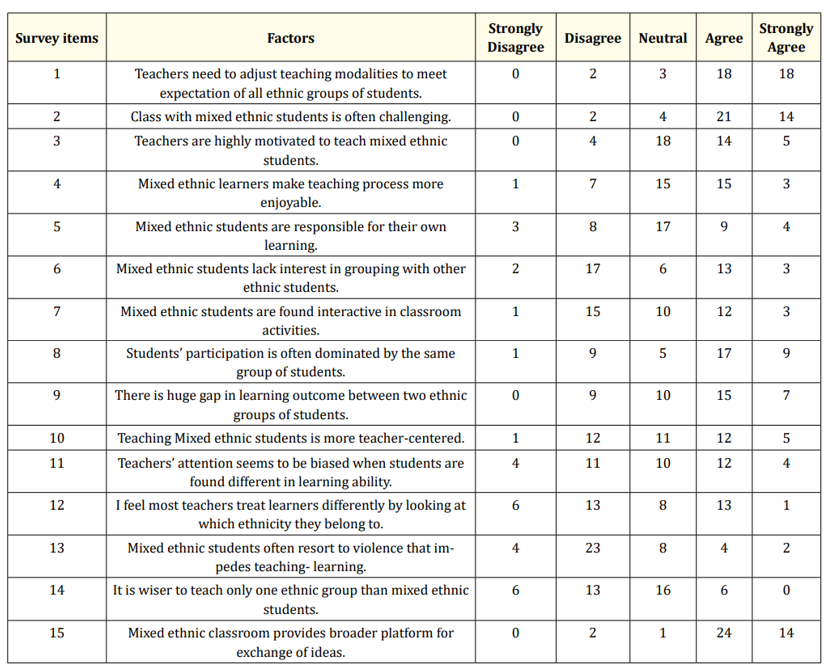
Table 1: Teachers’ Responses against each indicator (N = 41).
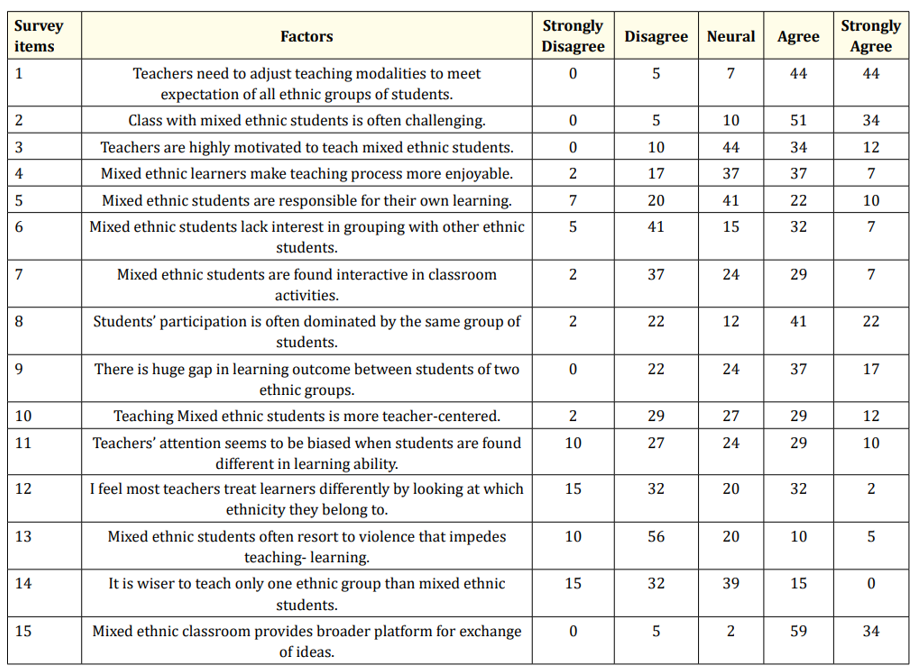
Table 2: Teachers’ perception in percentage.
The graph represents frequencies of responses for each factor. Majority of the participants are positive in teaching mixed ethnic students as scores of ‘Agree and Strongly Agree’ are higher than other scales: strongly disagree and disagree. For example, 24 participants have responded that teaching mixed ethnic classrooms provides broader platform for exchanging their ideas. At the same time, the participants shared that there are also challenges. For example, 44 percent of the participants chose the item ‘Teachers need to adjust teaching modalities to meet expectation of all ethnic groups of students’ and 51 percent says class with mixed ethnic students is often challenging.
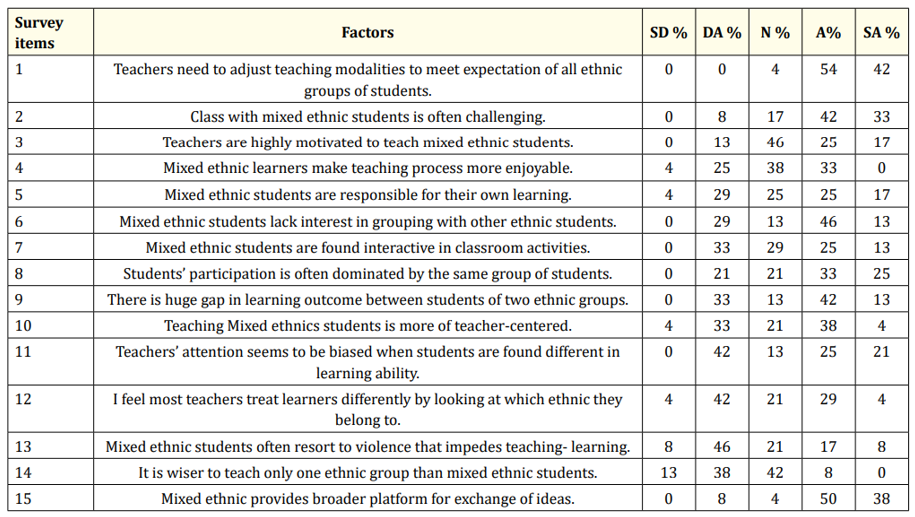
Table 3: Responses of male participants in percentage.
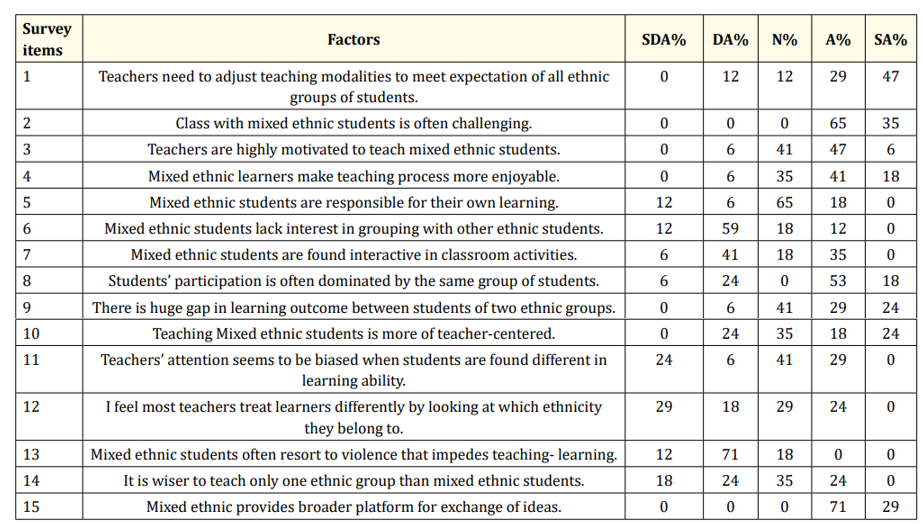
Table 4: Response of female participants in percentage.
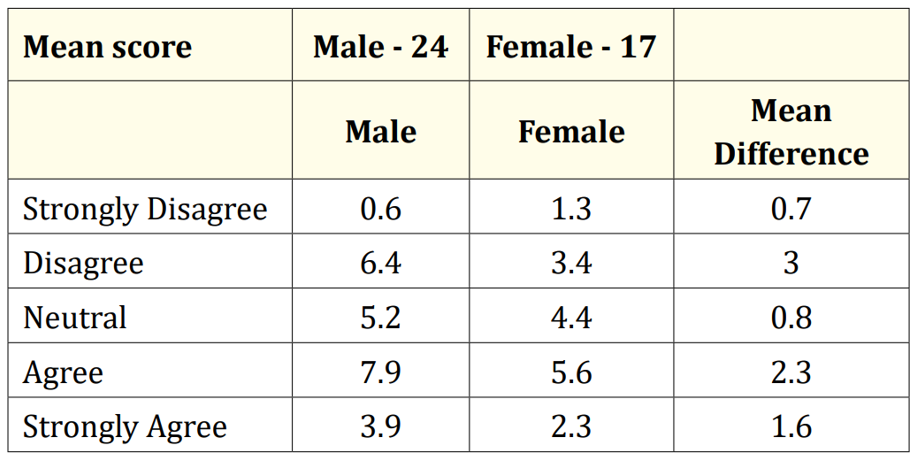
Table 5: Mean score of Perception of Male and Female Teachers’ Attitude.
The above table is a summation of table 4 and 5 showing the mean of 15 items on each Likert scale that there is a remarkable gender variance in the attitude of male and female teachers perceived by teachers themselves. The outcomes showed that male teachers on choosing ‘Agree’ and ‘Strongly Agree’ as positive attitude (M:7.9 and 3.9.) were statistically significantly higher on attitude as compared with female teachers with a mean of 5.6 and 2.3. The outcomes showed that the attitudes of male teachers were different from that of female faculty in teaching mixed ethnic students.
The above table represents difference between attitude of male and female teachers in teaching mixed ethnic students. The percentage score of both male and female teachers in most areas are low. However, in some areas, such as ‘Teachers need to adjust teaching modalities to meet expectation of all ethnic groups of students’, there is a huge disparity in disagreement with female with 12 percent disagree against 0 percent with male teachers. Likewise, in the item, ‘Mixed ethnic students lack interest in grouping with other ethnic students’, 12 percent of female teacher agree that mixed ethnic students lack interest in grouping with other students whereas 46 percent of male teachers agree with it. A close scrutiny of the overall scores between male and female teachers reveal variations of attitudes in teaching mixed ethnic students.
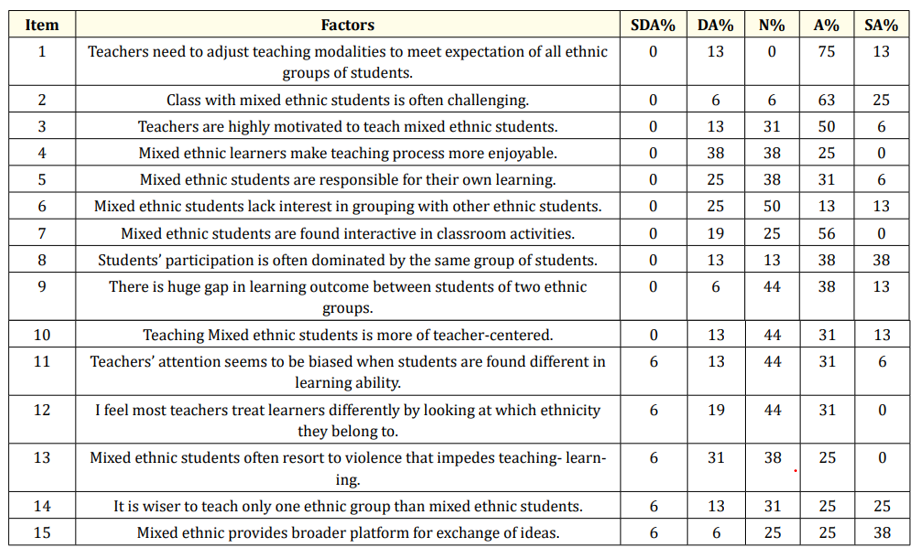
Table 6: Teaching experiences 0-10 Years (N-16).
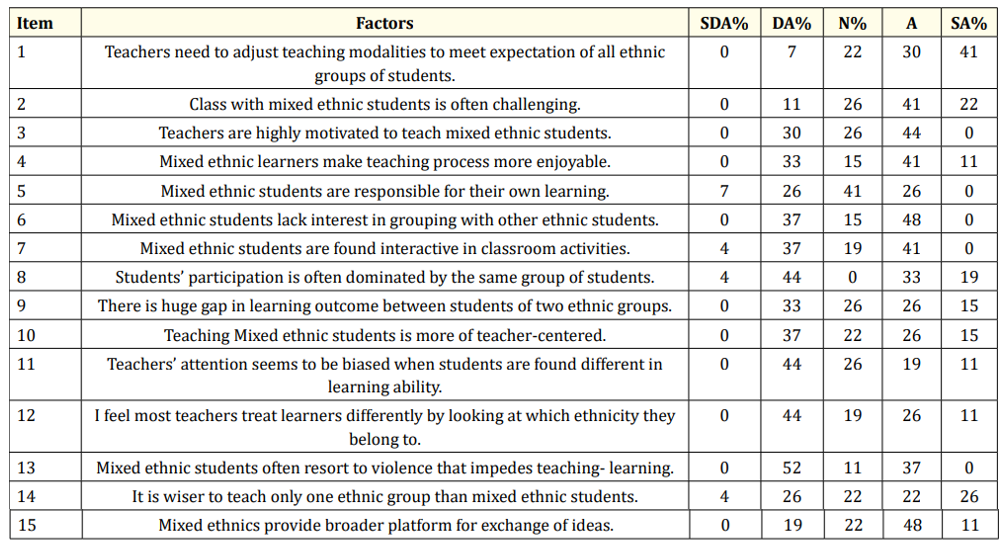
Table 7: Teaching Experience of 10 and above (N-27).
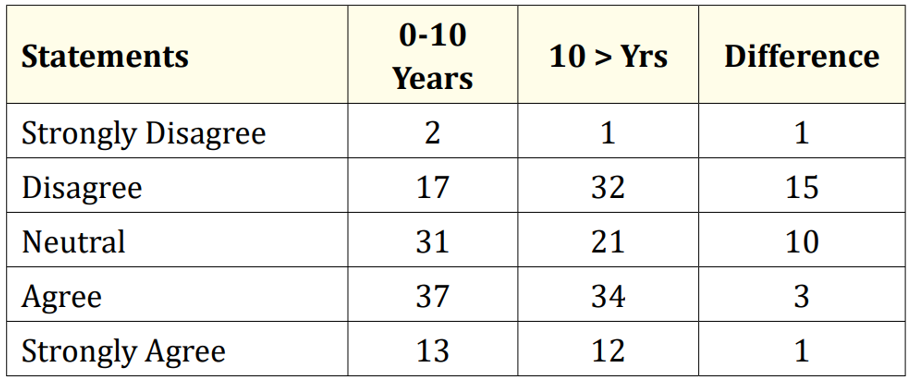
Table 8: Percentage of frequencies of responses against each statement of two categories of teaching experience.
The above table shows that there is significant difference between teaching categories of 0-10 years and more than 10 years of teaching experiences. However, there are marginal difference in some statements. Teachers teaching more than 10 years have more disagreement with some of the statements, which means teachers with more teaching experience have greater positive attitude towards teaching mixed ethnic students.
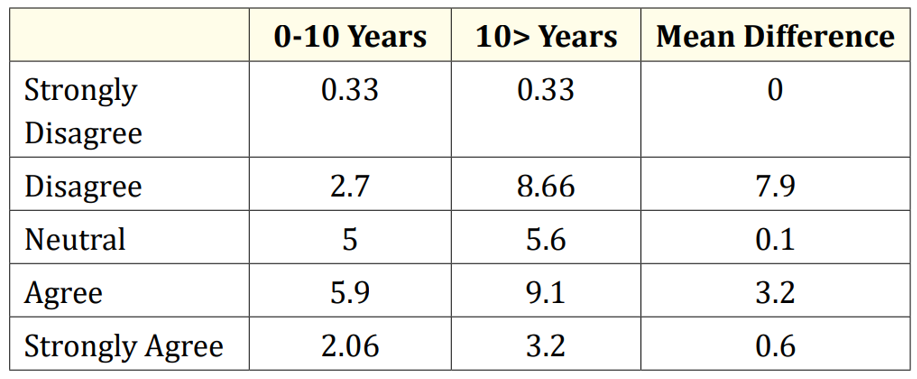
Table 9: Mean score of two categories of years of teaching experience.
The outcomes showed that teachers teaching more than 10 years by choosing ‘Agree’ and ‘ Strongly Agree’ as positive attitude (M =.9.1 and 3.2.) were statistically significantly higher on attitude as compared with teachers teaching 0-10 years with a mean of 5.9 and 2.06. It is found senior teachers with more than 10 years of teaching experience more in favor of teaching mixed ethnic students than those teachers with lesser years of teaching experience.
The above are Likert scale questions reports. The teachers’ responses are analyzed in percentile in three broad categories: i) the overall perceptions of male and female genders, ii) gender difference and iii) age and teaching experiences. The survey questionnaires are followed by the open-ended question, ‘to write teachers’ perception in teaching mixed ethnic students in about 50 words. Here are some examples.
Teaching mixed ethnic students provides an opportunity to exchange different ideas of their culture and practices. Mixed ethnic students have diverse views on any concept and skills. It also has some potential for facilitating intergroup contact among students from different social background (Dorji., et al. 2019) [7]. Another participant shared that teaching mixed ethnic students is not an issue in the higher classes.
Contrarily, as per some participants, teaching mixed ethnic students is quite challenging as teachers need to focus on different learning abilities of students. One participant shared that for students coming from different social backgrounds, classroom teaching alone is inadequate to meet the needs of individual child. On the other hand, another participant shared that there is risk of groupism based on their ethnicity.
However, the descriptive responses teachers provided to the open-ended questions demonstrated the effects of educational environment on teachers’ attitudes as expressed by the level of satisfaction of teachers in the study.
This study demonstrated that Bhutanese teachers working in schools where students come from diverse backgrounds in general have positive attitudes towards the teaching all backgrounds of ethnicity.
Although this study reveals gender differences in teachers’ attitudes towards teaching mixed ethnic students of two schools, a healthy classroom environment attributes the pupils to take interest in studies and perform well in examinations. So, healthy classroom environment is created only when teacher provides better learning opportunities and welcoming gestures of teachers irrespective of their learners’ differences. As stated by some of the participants, yet, it is very challenging to teach when students come from different learning abilities, however, schools must be proactive and prepared to face such challenges and handle them since the schools exist for the benefit of the students. This study is not an in-depth assessment of teachers’ attitude, as there are many other facets of assessment to understand teachers’ attitude. The findings are taken from limited sources subject to limited knowledge of the author and it is based on significantly small group of teachers and therefore could not be generalized to the entire teaching fraternity. It is a mere research where data was ingested within limited time period. Rather, the research neither recommends any stakeholders to uphold on to its outcomes, nor to does it intend to dissuade individuals concerned, or to target any individuals’ weaknesses.
Appendix I
Copyright: © 2023 Pema Tshewang and Cheten Gyeltshen. This is an open-access article distributed under the terms of the Creative Commons Attribution License, which permits unrestricted use, distribution, and reproduction in any medium, provided the original author and source are credited.
ff
© 2024 Acta Scientific, All rights reserved.